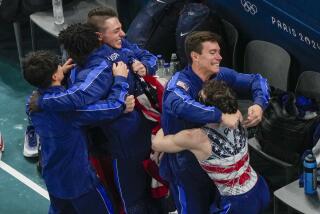On Many Levels, Athletes and Fans Give It Their Best Shot
- Share via
MIDWAY, Utah — It was as if someone with a gigantic crane uprooted and transported an entire European biathlon stage across the Atlantic Ocean and then brick by brick reassembled it to provide a day of great theater.
Biathlon was invented by Norwegians and perfected with some help from neighboring Sweden, but such an atmosphere was unheard of for the United States. Monday, the Soldier Hollow venue for the 2002 Winter Olympics might as well have been Oslo or Stockholm.
There were 8,500 spectators sitting and standing in the sunshine and about an equal number seemed to be waving flags. Just about as many Norwegian and Swedish flags as American banners.
Though the only guys doing the NFL thing and painting their faces with symbols of their country seemed to be Norwegian. Of course, biathlon is as big in Norway as football is in the U.S., so it was only fitting.
On a day that may have seen the best-ever American men’s Olympic showing--and foreshadowed an even better week ahead--the Norwegians certainly received their payoff. Already a national hero from his 1998 Olympic gold medal performance and his multiple World Championship medals, Ole Einar Bjoerndalen won the men’s 20-kilometer gold medal in 49 minutes, 3.3 seconds. And Liv Grete Poiree won the silver medal in the women’s 15 kilometer.
But it was really a United Nations celebration. Andrea Henkel of Germany won the women’s race in 47:29.1, and Magdalena Forsberg of Sweden at last won an Olympic medal, taking the bronze. Forsberg has won the last five World Cup titles but had never done well in the Olympics. Until she missed two targets in her final shooting round. she had gold in her sights.
“I think I did very well except for the two shots I missed,” Forsberg said. “I’m very happy to win the bronze medal. My legs were so shaky--that happens when you ski hard on the tracks. But of course it’s also a combination of pressure and of being nervous.”
Biathlon combines shooting accuracy--aiming a .22-caliber rifle at 4-centimeter-wide targets 50 meters away--and cross-country skiing. The athletes must ski as hard as they can, then try to will their heartbeats down to a manageable level when they shoot.
Americans have never won an Olympic medal, but the way the fans responded you might have thought it was the World Series. There is no real history of crowd turnout and enthusiasm for the sport in the U.S., but most Europeans felt at home too.
In Europe there is more sophisticated cheering. The loudest shouts follow clean shots. The Norwegians emulated that style here. Forsberg said the energy from fans was palpable, but they cheered differently.
“In America,” she said, “they scream all the time.”
American biathlon had quite a bit to scream about Monday. U.S. fans decorated the whole neighborhood except the course backdrop wall of snow featuring turquoise Olympic rings that resembled a big frosted cake baked for the occasion. Friends and family members made banners. That was all visual, but the decibel level caught American racers off guard.
Jeremy Teela of Anchorage, Alaska, and an Army specialist who is a member of the service’s World Class Athlete Program, placed 14th, equaling the top finish of any American ever in an Olympics, and Jay Hakkinen of Kasilof, Alaska, placed 26th. Bjoerndalen, who also raced in the 30-kilometer cross-country event for Norway on Saturday, edged Frank Luck of Germany, who won silver, and Victor Maigourov of Russia, who took bronze, but the real shock was Teela’s finish. Teela, 25, didn’t feel sharp, and although he made 18 of 20 shots prone and standing, he didn’t think he skied well. He and Hakkinen consider Wednesday’s 10-kilometer sprint their best event--and the nation’s best chance for a top 10 or a historic medal.
At the opening ceremony, Teela was seated near President Bush--and he is one of the athletes who passed his cell phone to the president to chat with his girlfriend. Ninth in the world championship sprint in 2001, Teela said he would be nowhere without the Army’s program.
“It feels good to represent all the soldiers,” he said.
And he knows the noise will increase, flags will be waved more vigorously, and that he will feel even better if he represents the Army into the medals.
*
Lew Freedman is a staff writer for the Chicago Tribune, a Tribune newspaper.
More to Read
Go beyond the scoreboard
Get the latest on L.A.'s teams in the daily Sports Report newsletter.
You may occasionally receive promotional content from the Los Angeles Times.






